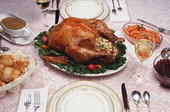- 8 Ways to Increase Dopamine Naturally
- 7 Best Breads for Maintaining Stable Blood Sugar
- Gelatin vs. Collagen: Which is Best for Skin, Nails, and Joints?
- The Long-Term Effects of Daily Turmeric Supplements on Liver Health
- Could Your Grocery Store Meat Be Causing Recurring UTIs?
- Are You Making This Expensive Thermostat Error This Winter?
- Recognizing the Signs of Hypothyroidism
- 10 Strategies to Overcome Insomnia
- Could Artificial Sweeteners Be Aging the Brain Faster?
- Techniques for Soothing Your Nervous System
Could Good Manners Help Spur Holiday Weight Gain?


Politeness and consideration for fellow diners could play a role in holiday weight gain, a new study suggests.
When people are picking snacks and other foods for themselves and someone else, their choices are different when the other person is average-sized than when the person is overweight, the researchers found.
In an experiment, participants chose a snack of either wheat crackers or chocolate chip cookies for themselves and a woman they had just met. In some cases, the woman was normal weight (wearing a size zero or two). At other times she wore a body suit that appeared to increase her weight by nearly 65 pounds (making her closer to a size 16).
Nearly 60 percent of the participants chose the same snack for themselves and the woman when she appeared overweight. This occurred about 30 percent of the time when the woman was her normal size.
“What the results show is that people pick the same snack to avoid offending someone they perceive as overweight,” study co-leader Gavan Fitzsimons, a marketing professor at the Duke University School of Business, said in a university news release.
“This means that people might pick unhealthier options for themselves and others during the holidays if they think not doing so could hurt someone’s feelings,” he said.
In additional experiments, participants told the researchers they thought it would be offensive to give an overweight person healthy food and then take unhealthy food for themselves, said study co-leader Peggy Liu, a marketing doctoral student. Similarly, they said it would be offensive to give an overweight person unhealthy food and then take healthy food for themselves.
“This suggests that if you are heading back to the buffet to cut a piece of pumpkin pie for your overweight uncle, you might also cut a larger piece than normal for yourself so you don’t hurt his feelings,” Liu said in the news release.
The study appears in the November issue of the journal Organizational Behavior and Human Decision Processes.
More information
The U.S. Centers for Disease Control and Prevention outlines how to prevent weight gain.
Source: HealthDay
Copyright © 2026 HealthDay. All rights reserved.










